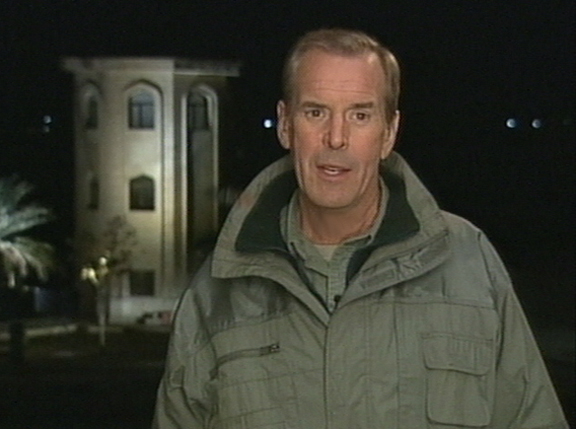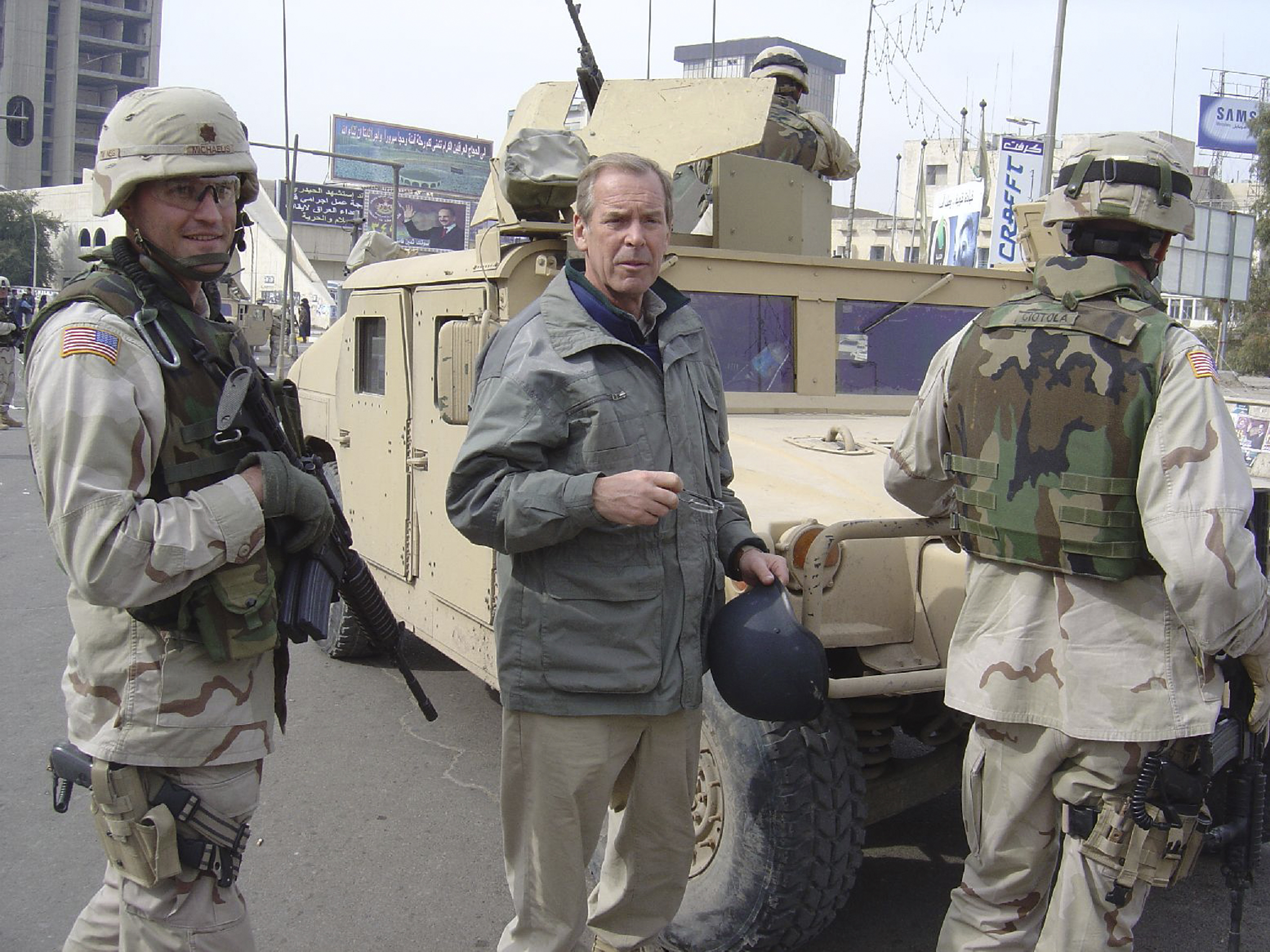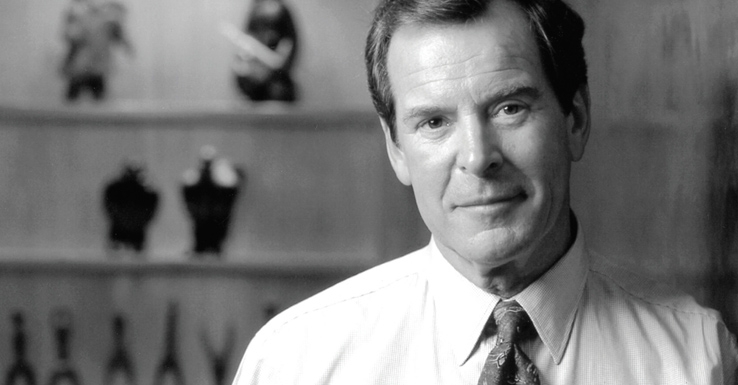He was mine as well.
I remember watching Peter as a kid, one of the only kids I knew that was watching "World News Tonight." He was professional, experienced, and fair. A newsman inside and out.
It's hard to believe that its already been 10 years since his death of lung cancer in 2005. Though he is gone, his career and his mark on television news will be here for a long time to come.
You can read about his career, and watch some tribute videos from 2005 below.
Reported World-Shaping Events
 As one of America's most distinguished journalists, Jennings reported many of the pivotal events that have shaped our world. He was in Berlin in the 1960s when the Berlin Wall was going up, and there in the '90s when it came down. He covered the civil rights movement in the southern United States during the 1960s, and the struggle for equality in South Africa during the 1970s and '80s. He was there when the Voting Rights Act was signed in 1965, and on the other side of the world when South Africans voted for the first time. He has worked in every European nation that once was behind the Iron Curtain. He was there when the independent political movement Solidarity was born in a Polish shipyard, and again when Poland's communist leaders were forced from power. And he was in Hungary, Czechoslovakia, East Germany, Romania and throughout the Soviet Union to record first the repression of communism and then its demise. He was one of the first reporters to go to Vietnam in the 1960s, and went back to the killing fields of Cambodia in the 1980s to remind Americans that, unless they did something, the terror would return.
As one of America's most distinguished journalists, Jennings reported many of the pivotal events that have shaped our world. He was in Berlin in the 1960s when the Berlin Wall was going up, and there in the '90s when it came down. He covered the civil rights movement in the southern United States during the 1960s, and the struggle for equality in South Africa during the 1970s and '80s. He was there when the Voting Rights Act was signed in 1965, and on the other side of the world when South Africans voted for the first time. He has worked in every European nation that once was behind the Iron Curtain. He was there when the independent political movement Solidarity was born in a Polish shipyard, and again when Poland's communist leaders were forced from power. And he was in Hungary, Czechoslovakia, East Germany, Romania and throughout the Soviet Union to record first the repression of communism and then its demise. He was one of the first reporters to go to Vietnam in the 1960s, and went back to the killing fields of Cambodia in the 1980s to remind Americans that, unless they did something, the terror would return.
On Dec. 31, 1999, Jennings anchored ABC's Peabody-award winning coverage of Millennium Eve, "ABC 2000." Some 175 million Americans watched the telecast, making it the biggest live global television event ever. "The day belonged to ABC News," wrote The Washington Post, "… with Peter Jennings doing a nearly superhuman job of anchoring." Jennings was the only anchor to appear live for 25 consecutive hours.
Jennings also led ABC's coverage of the Sept. 11 attacks and America's subsequent war on terrorism. He anchored more than 60 hours that week during the network's longest continuous period of news coverage, and was widely praised for providing a reassuring voice during the time of crisis. TV Guide called him "the center of gravity," while the Washington Post wrote, "Jennings, in his shirt sleeves, did a Herculean job of coverage." The coverage earned ABC News Peabody and duPont awards.
Overseas, and at Home
 Jennings joined ABC News on Aug. 3, 1964. He served as the anchor of "Peter Jennings with the News" from 1965 to 1967.
Jennings joined ABC News on Aug. 3, 1964. He served as the anchor of "Peter Jennings with the News" from 1965 to 1967.
He established the first American television news bureau in the Arab world in 1968 when he served as ABC News' bureau chief for Beirut, Lebanon, a position he held for seven years. He helped put ABC News on the map in 1972 with his coverage of the Summer Olympics in Munich, when Arab terrorists took Israeli athletes hostage.
In 1975, Jennings moved to Washington to become the news anchor of ABC's morning program "A.M. America". After a short stint in the mornings, Jennings returned overseas to Rome where he stayed before moving to London to become ABC's Chief Foreign Correspondent. In 1978 he was named the foreign desk anchor for "World News Tonight." He co-anchored the program with Frank Reynolds in Washington, D.C., and Max Robinson in Chicago until 1983.
Jennings was named anchor and senior editor of "World News Tonight" in 1983. In his more than 20 years in the position he was honored with almost every major award given to television journalists.
His extensive domestic and overseas reporting experience was evident in "World News Tonight's" coverage of major crises. He reported from all 50 states and locations around the globe. During the 1991 Gulf War and the 2003 War in Iraq, his knowledge of Middle Eastern affairs brought invaluable perspective to ABC News' coverage of the war in Iraq and the drug trade in Central and South America. The series also tackled important domestic issues such as gun control policy, the politics of abortion, the crisis in funding for the arts and a highly praised chronicle of the accused bombers of Oklahoma City. "Peter Jennings Reporting" earned numerous awards, including the 2004 Edward R. Morrow award for best documentary for "The Kennedy Assassination — Beyond Conspiracy."
Jennings also had a particular interest in broadcasting for the next generation. He did numerous live news specials for children on subjects ranging from growing up in the age of AIDS, to prejudice and its effects on our society. After the events of September 11, and again on the first anniversary, he anchored a town hall meeting for children and parents entitled, "Answering Children's Questions."
Jennings was honored with many awards for news reporting, including 16 Emmys, two George Foster Peabody Awards, several Alfred I. duPont-Columbia University Awards and several Overseas Press Club Awards. Most recently, "World News Tonight" was recognized with two consecutive Edward R. Murrow awards for best newscast, based on field reporting done by Jennings on the California wildfires and the transfer of power in Iraq.
Jennings was the author, with Todd Brewster, of the acclaimed New York Times best seller, "The Century." It featured first-person accounts of the great events of the century. In 1999, he anchored the 12-hour ABC series, "The Century," and ABC's series for The History Channel, "America's Time." He and Brewster also published "In Search of America," a companion book for the six-part ABC News series.
His start
 Genetics may have had something to do with Jennings' passion for journalism.
Genetics may have had something to do with Jennings' passion for journalism.
His father, Charles Jennings, was the first nightly anchor in Canadian television journalism and later headed the CBC.
He always kept a picture of his dad prominently displayed in his office at ABC News.
At the age of nine, Peter Jennings had a radio show in Ottawa on Saturday mornings.
He never finished high school or college -- something Koppel said his friend always regretted.
"I have never spent a day in my adult life where I didn't learn something,'' Jennings told the Saturday Evening Post. "And if there is a born-again quality to me, that's it.''
The drop-out is the co-author, with Todd Brewster, of two books: The Century and In Search of America.
Instead of getting a formal education, Jennings entered the working world of broadcasting as a news reporter in Brockville, Ont.
Jennings quickly became an anchor at CTV. But while covering the U.S. Democratic national convention in 1964, his work caught the eye of ABC's news president, who offered him a job.
ABC gambled on making him an anchor -- at age 26. His first broadcast was Feb. 1, 1965. In retrospect, even Jennings thought that was a bit much, seeing as he was competing against CBS's Walter Cronkite and Huntley and Brinkley at NBC.
Critics pounded on him. He lasted three years before being reassigned as a foreign correspondent -- an area in which he thrived, covering stories like the murder of Israeli athletes at the 1972 Olympics in Munich.
The Middle East became his special bailiwick. He earned a Peabody Award for a 1974 profile of Anwar Sadat.
In 1978, Jennings returned to the anchor desk as part of a three-person team. He was based in London.
But when, Frank Reynolds, one of the other anchors, died from cancer, Jennings was made sole anchor, starting Sept. 5, 1983.
Rising to the top
 In 1986, Jennings rose to the top of the ratings and stayed there for a decade. His foreign experience shone through. Even the show's name, World News Tonight, suggested a more sophisticated approach.
In 1986, Jennings rose to the top of the ratings and stayed there for a decade. His foreign experience shone through. Even the show's name, World News Tonight, suggested a more sophisticated approach.
Fans responded to his intelligent, controlled style. Jennings said in one interview the anchor should keep his or her emotions under control.
Not only fans recognized Jennings' approach. A 1993 survey by Broadcasting and Cable magazine found Jennings to be the best anchor. Washington Journalism Review named him anchor of the year three straight years.
Times, however, change. Americans lost interest in the world, and NBC's Tom Brokaw surpassed Jennings in the latter 1990s. But Jennings was always close.
Brokaw retired in November 2004 and Rather stepped down in March -- a move seen as prompted by a journalistic scandal.
When Jennings, a long-time smoker, announced he had lung cancer, he said: "I will continue to do the broadcast.
"On good days, my voice will not always be like this," he said, referring to how husky and strained it sounded.
He would never appear on air again.
"He knew that it was an uphill struggle. But he faced it with realism, courage, and a firm hope that he would be one of the fortunate ones,'' Westin said. "In the end, he was not.''
In retrospect, one clue Jennings' health could have been deteriorating was when he didn't travel to Asia to cover the tsunami disaster from the field.
Highlights from Jennings' television news career:
1962 - co-anchor for CTV news.
1964 - joins ABC News.
1965-1968 - anchor of "ABC Evening News" while still in his 20s.
1968-1974 - established first American television news bureau in the Arab world as ABC bureau chief in Beirut, Lebanon.
1975-1976 - news anchor for "A.M. America," predecessor to "Good Morning America."
1977 - chief foreign correspondent.
1978-1983 - chief foreign correspondent for ABC News and foreign desk anchor for "World News Tonight."
1983-2005 - anchor and senior editor of ABC's "World News Tonight."
Note: The videos are low quality, remember they are from 2005!
Note: The videos are low quality, remember they are from 2005!




